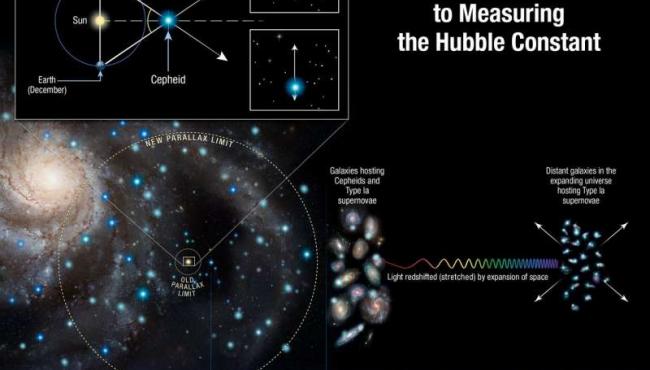
Using observations from Hubble Space Telescope, researchers suggest that the universe is expanding at a faster rate
Astronomers have just made a new measurement of the expansion rate of the universe, and it is not consistent with the previous estimates, suggesting that something unexpected is involved in the process.
Our universe was formed 13.8 billion years ago in Big Bang and has been expanding ever since. As a result, distant galaxies in the universe appear to be moving away from us faster than closer ones.
Astronomers usually describe the expansion of the universe regarding Hubble parameter. It allows them to measure the distance to the most farther objects we can see and provide a value known as Hubble constant. But the Hubble parameter hasn’t always had the same value. Latest Hubble results also support this notion and suggest that the universe is expanding faster now than was expected from its trajectory seen shortly after the big bang.
“The community is grappling with understanding the meaning of this discrepancy.” Lead researcher Adam Riess of the Space Telescope Science Institute (STScI) and Johns Hopkins University said in a statement.
Adam Riess and his team have been using Hubble over the past six years to refine the measurements of the distances to galaxies by looking at their stars.
Previous studies predicted that the Hubble constant value should now be 67 kilometers per second per megaparsec (3.3 million light-years). This means that if we have a galaxy 3.3 million light-years away, it would be expanding away from us at a speed of 67 kilometers per second. But new measurements give a value of about 73 kilometers per second per megaparsec, indicating galaxies are moving at a faster rate than implied by earlier observations.
“Both results have been tested multiple ways, so barring a series of unrelated mistakes,” explained Riess. “It is increasingly likely that this is not a bug but a feature of the universe.”
Researchers have also outlined a few possible explanations for the mismatch. The most important is dark energy which makes up about three-quarters of the universe and drives cosmic expansion. The findings suggest that acceleration itself might not have a constant value in the universe but changes over time.
The latest Hubble result is based on measurements of the parallax of eight newly analyzed Cepheid stars in our Milky Way galaxy.